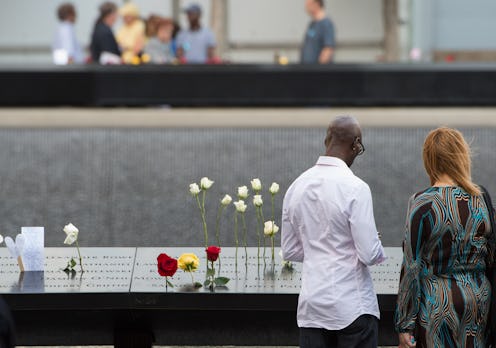News
How To Remember 9/11, Even If You Can't
I was six years old on the morning of September 11th, 2001, sitting in my first grade classroom like any other Tuesday morning, when an aide burst into the room and told my teacher to turn on the television. With my 20-plus classmates, we silently watched the second tower come down live on TV. As an Army brat, I think I might have a slightly clearer recollection of the day than most of my cohort, because I almost instantly realized that this was not an accident, and that the country was going to have to fight back. But even then, the memories are fuzzy, almost disappointingly unclear for an event that had such a huge and shaping effect on the rest of my life. It's hard to remember 9/11 because I was so young, but it's absolutely crucial both to try and to think about that day in the proper context.
For those who have only the vaguest memories of 9/11, there's a unique yearning to have been more conscious and aware of what was going on in the aftermath of the tragedy. The United States and the world changed so much in the following years, and it feels like only recently has my generation become cognizant of how that day impacted us, our culture, and our future. I often wish I had been older, so I could have really felt what was happening and been able to process it, instead of now feeling that I have a scar from a wound I can't remember.
But you can start to retroactively make sense of it now, if you put in some work. You have to make a conscious effort to think about 9/11, but it is possible for you to honor the day with understanding.
An important way to remember 9/11 is through involvement in the continuing cultural reconstruction that the United States is still undergoing. Americans are still dealing with how to think about security and national defense in a previously unprecedented way, and not all reactions have been ones to be praised. But you can be part of the solution. You can donate to charities that benefit veterans, organize or attend diversity workshops to combat Islamophobia in your community, or volunteer with political organizations that promote peace and social justice. Work toward building a world where people don't harbor hate in their hearts.
Another part of understanding the tragedy involves realizing that the United States is not blameless in all that came after 9/11. The Iraq and Afghanistan wars often seem like slow, dreadful nightmares, particularly because I can't really remember how they got started. Making the reality of the wars feel real takes effort. There are some great, insightful books on the human impact of the wars, as well as historical breakdowns of the long, geopolitical history that contributed to 9/11. Having a one-sided view of the situation won't help anyone move forward in the future, so take the opportunity to develop and reflect on a holistic perspective of 9/11.
Finally, and this is probably the easiest one to do, remember the heroism and sacrifice of all the incredible men and women who embodied the American spirit on 9/11 and all the days after. That tragedy brought out incredible actions in people who were put in incredible situations. In those harrowing moments, they lived and died for others, which is something everyone can aspire to. Even if you can't really remember it yourself, let the full meaning of that sink in.
Even 15 years after the attack, it's clear that the country is still very much in the process of healing. For those of us who don't remember much, who were protected from the raw emotion and painfully jarring paradigm shift, who know more about the destructive consequences than the day it happened, this is our opportunity to start building a better world. Remembering 9/11 — even if you can't remember that day — is how the country can move forward.
